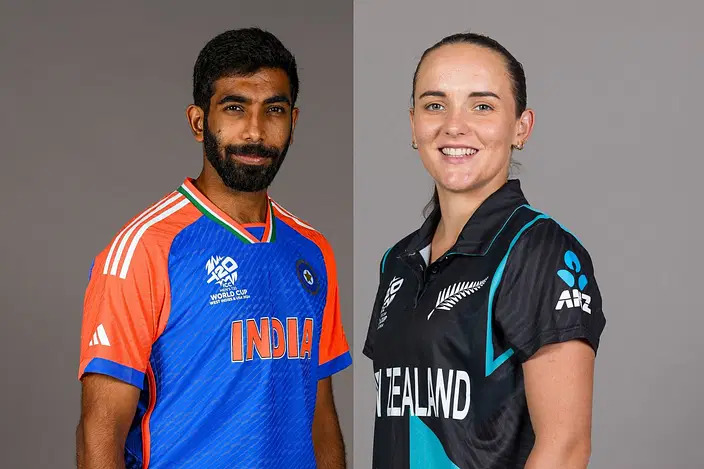Jasprit Bumrah and Amelia Kerr have had a dream year in terms of individual performances, and their remarkable achievements have now been officially recognized.
For the first time, India’s fast bowler Bumrah has been named the ICC Men’s Cricketer of the Year, earning the prestigious Sir Garfield Sobers Trophy. Meanwhile, New Zealand all-rounder Kerr has been awarded the ICC Women’s Cricketer of the Year, receiving the Rachel Heyhoe Flint Trophy.
On Tuesday, the ICC announced Bumrah and Kerr as the best male and female cricketers of 2024, based on votes from the media, the ICC Voting Academy, and the public.
In the race for the top honors, Bumrah outshone England’s Joe Root and Harry Brook, as well as Australia’s Travis Head. Kerr triumphed over Sri Lanka’s Chamari Athapaththu, South Africa’s Laura Wolvaardt, and Australia’s Annabel Sutherland.
Bumrah becomes the fifth Indian to win the ICC Men’s Cricketer of the Year award, and the first pacer from India to achieve this feat. The award, often referred to as cricket’s “Oscar,” was first introduced in 2004, with India’s Rahul Dravid being the inaugural winner. Since then, other Indian players such as Sachin Tendulkar (2010), Ravichandran Ashwin (2016), and Virat Kohli (2017, 2018) have also received the honor. On the women’s side, the award has been given since 2006, and Kerr is the first cricketer from New Zealand to win it.
In addition to being named ICC Cricketer of the Year, Bumrah has also been recognized as the Best Test Cricketer of 2024, while Kerr was named the Best T20I Cricketer of 2024.
Bumrah’s outstanding bowling performance in 2024 was a key highlight. He terrorized batsmen across all formats, taking a total of 86 wickets in 21 matches, the highest of the year. Sri Lanka’s Wanindu Hasaranga was second with 64 wickets, 22 fewer than Bumrah.
Bumrah also played a vital role in India’s T20 World Cup win, earning the Player of the Tournament award. Furthermore, he made history in the Border-Gavaskar Trophy, becoming the first bowler to take 200 Test wickets at an average of under 20. His exceptional performance in Test cricket saw him take 71 wickets in 13 matches, finishing the year as the top wicket-taker. His economy rate of 2.96 was impressive, and he ended the year with 907 rating points, setting a new record for Indian bowlers in Test rankings.
Kerr, 24, was equally impressive with both bat and ball. She scored 387 runs in 18 T20I matches, with an outstanding 29 wickets, a record for most wickets in a calendar year in women’s T20I cricket. In 9 ODI matches, she made 257 runs and took 14 wickets.
Kerr was instrumental in New Zealand’s first-ever Women’s T20 World Cup victory. In the tournament, she scored 135 runs in 6 matches at an average of 27. She also claimed 15 wickets, the most in a single Women’s T20 World Cup tournament.
In the final against South Africa in Dubai, Kerr’s all-round performance was key to New Zealand’s victory. She made 43 runs off 38 balls, including four boundaries, and also took 3 wickets for 24 runs, earning both Player of the Match and Player of the Tournament honors.






